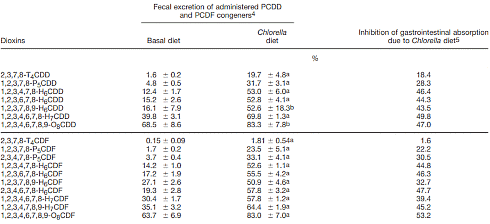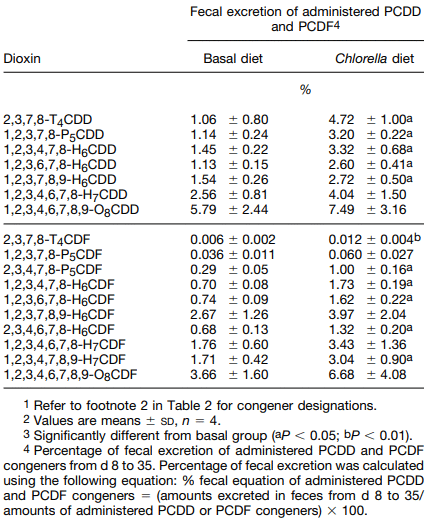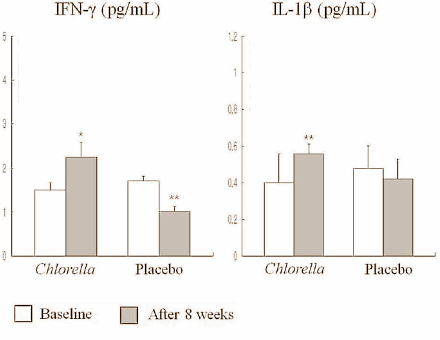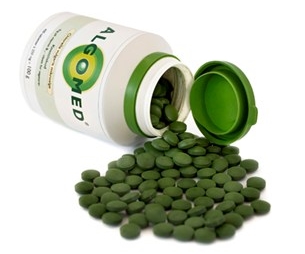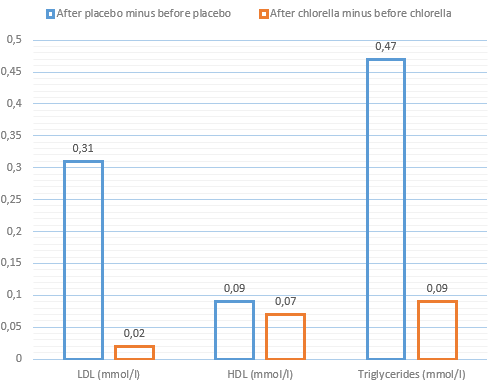|
Definition: "An ergogenic aid is any substance or phenomenon that enhances performance "
|
|
||||||||
10.06.2021 |
|
|
Chlorella is an antidote against dioxins
Chlorella detoxifies the body, supplement sellers tell you. Sales pitch, we always thought. Until we came across an almost forgotten Japanese animal study from 1999, in which chlorella supplementation not only reduces the absorption of toxic dioxins by the body, but also ensures that dioxins that the body has already absorbed are still removed through the feces.
Dioxins
In Japan, this happened in 1968, when dioxins were contained in rice oil in the Yusho region. Symptoms of dioxin poisoning include "fatigue, gastrointestinal disorder, joint pain, weight loss, anorexia, hyperpigmentation of the nails and skin, and porphyria".
Study 1
If the rats had been humans, they would have received roughly 60 grams of chlorella per day. That's quite a lot, by the way. Don't try this at home.
The supplementation increased the amount of dioxins in the stool. In a way the researchers don't fully understand, chlorella reduces the absorption of dioxins.
The table below has been reduced in size. Click on it for a larger version.
Study 2
The table below shows that chlorella also increases the amount of dioxins in the stool in this experiment.
Mechanism
"The first factor is dietary fiber in chlorella cells. We reported previously that several types of dietary fiber bind dioxin and stimulate the excretion [...]. After ingestion of chlorella, dietary fibers contained in chlorella cells may inhibit dioxin absorption from the digestive tract, promoting its excretion into feces."
"The second factor that may be involved in the inhibition of absorption and reabsorption of dioxin is the chlorophyll in chlorella cells. It has been reported that chlorophyllin, a chlorophyll derivative, forms a complex with heterocyclic amines. The chlorophyll contained in chlorella cells may form a complex with dioxin congeners with a planar structure, thereby inhibiting absorption in the digestive tract."
"The third component that may be involved in the reabsorption of dioxin is the lipid in chlorella cells. It has been reported that [...] chlorella lipids composed of glycolipid and phospholipid in rats fed a high cholesterol diet, and found that chlorella prevented the absorption of endogenous and exogenous cholesterol in bile and increased the excretion of cholesterol from the body."
"Therefore, fiber, chlorophyll, and lipids contained in chlorella cells may be involved in the inhibition of absorption of dioxin in the digestive tract and reabsorption of dioxins in bile."
"To prevent damage by dioxin in humans, dioxin ingested via food should be captured in the digestive tract and absorption should be decreased by ingestion of foods such as chlorella, which contains abundant dietary fiber and chlorophyll."
"In addition, excretion of dioxin already accumulated in the body should be promoted by increasing catabolism and inhibiting reabsorption of bile and dioxin secreted into the digestive tract."
Source: More:
|
|
||||||||||||||||



